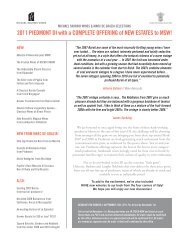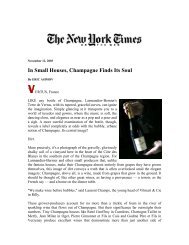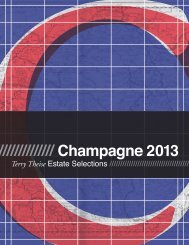German Catalog 2006 USE THIS ONE.qxp - Michael Skurnik Wines
German Catalog 2006 USE THIS ONE.qxp - Michael Skurnik Wines
German Catalog 2006 USE THIS ONE.qxp - Michael Skurnik Wines
Create successful ePaper yourself
Turn your PDF publications into a flip-book with our unique Google optimized e-Paper software.
88<br />
Is all taste equally valid?<br />
Sure it is! There’s a feel-good, all-American<br />
democratic answer for you. One man’s opinion’s as<br />
good as another’s and all that. It is self-evidently the<br />
right answer to the question.<br />
It’s the question that’s bogus.<br />
One evening at the ballgame I had the good fortune<br />
to sit next to one of the advance scouts who<br />
attend every game, gathering intel on the players. It<br />
was a slow night, and I asked if he could “think out<br />
loud” for me, tell me what he saw. And what he saw<br />
was an entirely different ballgame from the one I<br />
saw. I sat in admiration of his trained eye.<br />
Similarly, if I take my car to the mechanic he<br />
hears different things in the engine’s hum than I do.<br />
A piano tuner hears minute tonal variances to which<br />
I am effectively deaf. A massage therapist discerns<br />
muscle tensions of which I’m not consciously aware.<br />
All these are examples of expertise we take for<br />
granted. And yet if someone asserts expertise in<br />
wine, we are promptly suspicious; we sniff for snobbism,<br />
we get defensive and put up our dukes — and<br />
I have always wondered why.<br />
Wine writers such as my friend Jennifer Rosen<br />
feel a degree of responsibility to “demystify” wine,<br />
to make it accessible to everyman. That way, they<br />
reason, more people will drink it and the world will<br />
be improved. Other wine writers want to reassure<br />
you there are no “rules” and that you should always<br />
drink what you like; reasonable advice on the face of<br />
it. If you like drinking young Barolo with a dozen<br />
raw oysters I won’t stop you (though I’ll shudder to<br />
think what’s going on inside your mouth). If you like<br />
a beer with five sardines steeped in it for 20 minutes,<br />
go on and drink it that way. No one wants to keep<br />
you from the consequences of your perverse taste.<br />
No one denies your “right” to it.<br />
Some of us, however, like to call things by their<br />
proper names. Not from snobbism, sadism or any<br />
other ism, but because it helps to order the world of<br />
experience. It fends off the chaos.<br />
I had a conversation on an airplane recently,<br />
with a cellist in her 20s. We talked about music, naturally,<br />
and it became clear to me her tastes were<br />
wider than my own. (I’m an ossified old geez in his<br />
early 50s.) I remarked upon her ecumenical listening<br />
habits. “Well,” she said, “don’t you think one should<br />
search for the virtues in everything?” Much as I<br />
wished to say yes, to do so would have been false.<br />
Instead I said: “No, I think you should seek the good<br />
in everything; that’s where you are in your life. But<br />
what I need to do is identify that which annoys or<br />
wounds me, and avoid it.”<br />
Stuart Pigott once wrote: “We should . . . start<br />
making wines with balance, elegance and originality<br />
sound so astonishing that our readers feel they’ve<br />
just got to try them,” and this of course is true. A critic<br />
must stand for something; otherwise he is merely<br />
pusillanimous. And so our first task is to find the<br />
good and praise it. But any time we take a stand FOR<br />
something, we imply the thing’s shadow, i.e. the<br />
thing we love suggests, ineluctably, the thing we<br />
don’t love. And we cannot shrink from naming both<br />
things, especially not for fear of wounding the delicate<br />
sensibilities of the philistines (who, by the way,<br />
are both robustly insensitive and also have no scruples<br />
about insulting us with labels such as “snob”,<br />
“elitist” et.al.).<br />
God knows we’d prefer to be everyone’s best<br />
friend, and we feel humane and generous telling<br />
anyone with unformed (or simply atrocious) taste<br />
that his taste is as good as anyone else’s. But it’s a lie<br />
we tell so that we can feel noble, and furthermore it<br />
is unfair to the recipient, who, if he’s being patron-
















